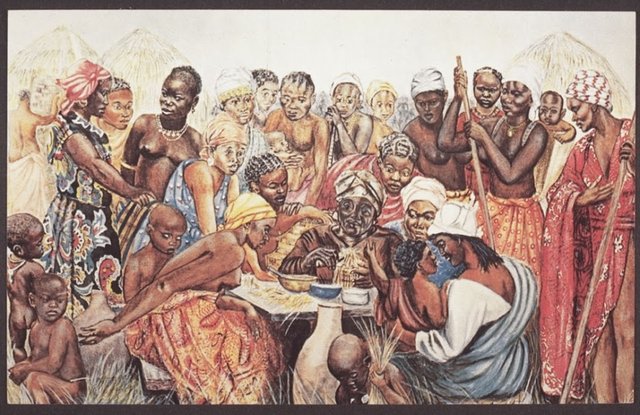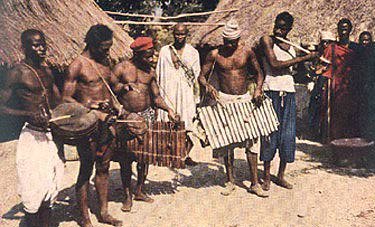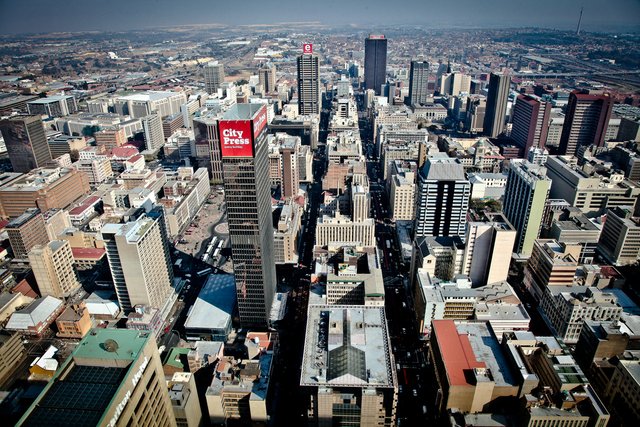BLACK ORIGIN
As a way of introduction, let's look into the rich history of Africa briefly.

"Zanzibar, before 1899," Winterton Collection of East African Photographs, Melville J. Herskovits Library of African Studies, Northwestern, Item 74-20-2.
THE ANCIENT AFRICA
Scientists believe that Africa was the birthplace of mankind. By 100,000 BC modern humans lived by hunting and gathering with stone tools. From Africa they spread to Europe. By 5,000 farming had spread to North Africa. People herded cattle and they grew crops. At that time the Sahara Desert was not a desert. It was a green and fertile area. Gradually it grew drier and became a desert. Meanwhile about 3,200 BC writing was invented in Egypt. The Egyptians made tools and weapons of bronze. However by the time Egyptian civilization arose most of Africa was cut off from Egypt and other early civilizations by the Sahara Desert. Sub-Saharan Africa was also hampered by its lack of good harbors, which made transport by sea difficult. Farmers in Africa continued to use stone tools and weapons however about 600 BC the use of iron spread in North Africa. It gradually spread south and by 500 AD iron tools and weapons had reached what is now South Africa.
About 480 BC the Phoenicians from what is now Lebanon founded the city of Carthage in Tunisia. Carthage later fought wars with Rome and in 202 BC the Romans defeated the Carthaginians at the battle of Zama. In 146 BC Rome destroyed the city of Carthage and made its territory part of their empire. Meanwhile Egyptian influence spread along the Nile and the kingdoms of Nubia and Kush arose in what is now Sudan. By 100 AD the kingdom of Axum in Ethiopia was highly civilized. Axum traded with Rome, Arabia and India. Axum became Christian in the 4th century AD. Meanwhile the Roman Empire continued to expand. In 30 BC Egypt became a province of Rome. Morocco was absorbed in 42 AD. However the rest of Africa was cut off from Rome by the Sahara Desert.


AFRICA IN THE MIDDLE AGES
In 642 the Arabs conquered Egypt. In 698-700 they took Tunis and Carthage and soon they controlled all of the coast of North Africa. The Arabs were Muslims, of course, and soon the whole coast of North Africa converted to Islam. Ethiopia remained Christian but it was cut off from Europe by the Muslims. After 800 AD organised kingdoms emerged in northern Africa. They traded with the Arabs further north. (Trade with the Arabs led to the spread of Islam to other parts of Africa). Arab merchants brought luxury goods and salt. In return they purchased gold and slaves from the Africans. One of the earliest African kingdoms was Ghana (It included parts of Mali and Mauritania as well as the modern country of Ghana). By the 9th century Ghana was called the land of gold. However Ghana was destroyed in the 11th century by Africans from further north.
By the 11th century the city of Ife in Southwest Nigeria was the capital of a great kingdom. From the 12th century craftsmen from Ife made terracotta sculptures and bronze heads. However by the 16th century Ife was declining. Another African state was Benin. (The medieval kingdom of Benin was bigger than the modern country). From the 13th century Benin was rich and powerful. Meanwhile the kingdom of Mali was founded in the 13th century. By the 14th century Mali was rich and powerful. Its cities included Timbuktu, which was a busy trading center where salt, horses, gold and slaves were sold. However the kingdom of Mali was destroyed by Songhai in the 16th century. Songhai was a kingdom situated east of Mali on the River Niger from the 14th century to the 16th century. Songhai reached a peak about 1500 AD. However in 1591 they were defeated by the Moroccans and their kingdom broke up.
Another great north African state was Kanem-Bornu, located near Lake Chad. Kanem-Bornu rose to prominence in the 9th century and it remained independent till the 19th century. Meanwhile the Arabs also sailed down the east coast of Africa. Some of them settled there and they founded states such as Mogadishu. They also settled on Zanzibar. Inland some people in southern Africa formed organised kingdoms. About 1430 impressive stone buildings were erected at Great Zimbabwe. Meanwhile in the Middle Ages Ethiopia flourished.  was built about 1200. Meanwhile the Portuguese were exploring the coast of Africa. In 1431 they reached the Azores. Then in 1445 they reached the mouth of the River Congo. Finally in 1488 the Portuguese sailed around the Cape of Good Hope.
was built about 1200. Meanwhile the Portuguese were exploring the coast of Africa. In 1431 they reached the Azores. Then in 1445 they reached the mouth of the River Congo. Finally in 1488 the Portuguese sailed around the Cape of Good Hope.


The famous church of St George in Ethiopia

AFRICA 1500-1800
In the 16th century Europeans began to transport African slaves across the Atlantic. However slavery was nothing new in Africa. For centuries Africans had sold other Africans to the Arabs as slaves. However the trans-Atlantic slave trade grew until it was huge. In the 18th century ships from Britain took manufactured goods to Africa. They took slaves from there to the West Indies and took sugar back to Britain. This was called the Triangular Trade. (Many other European countries were involved in the slave trade). Some Africans were sold into slavery because they had committed a crime. However many slaves were captured in raids by other Africans. Europeans were not allowed to travel inland to find slaves. Instead Africans brought slaves to the coast. Any slaves who were not sold were either killed or used as slaves by other Africans. The slave trade would have been impossible without the co-operation of Africans many of whom grew rich on the slave trade.
Meanwhile from the 16th to the 18th centuries Barbary pirates from the North African coast robbed Spanish and Portuguese ships. In the 16th century a people called the Turks conquered most of the North African coast. In 1517 they captured Egypt and by 1556 most of the coast was in their hands. Further South Africans continued to build powerful kingdoms. The empire of Kanem-Bornu expanded in the 16th century using guns bought from the Turks. However in the 16th century Ethiopia declined in power and importance although it survived. Meanwhile the Europeans founded their first colonies in Africa. In the 16th century the Portuguese settled in Angola and Mozambique while in 1652 the Dutch founded a colony in South Africa.
MODERN AFRICA
In the 19th century European states tried to stop the slave trade. Britain banned the slave trade in 1807. On the other hand in the late 19th century Europeans colonized most of Africa! In 1814 the British took the Dutch colony in South Africa. In 1830 the French invaded northern Algeria. However, colonization only became serious in the late 19th century when Europeans 'carved up' Africa. In 1884 the Germans took Namibia, Togo and Cameroon and in 1885 they took Tanzania. In 1885 Belgium took over what is now Democratic Republic of Congo. The French took Madagascar in 1896. They also expanded their empire in northern Africa. In 1912 they took Morocco and Italy took Libya. In 1914 the British took control of Egypt. By then all of Africa was in European hands except Liberia and Ethiopia. The Italians invaded Ethiopia in 1896 but they were defeated by the Ethiopians.
Further south the British took Zimbabwe, Zambia, Malawi, Uganda and Kenya. The British also took control of Egypt. Angola and Mozambique remained Portuguese. However in the early 20th century attitudes to imperialism began to change in Europe. Furthermore in Africa churches provided schools and increasing numbers of Africans became educated. They became impatient for independence. The movement for African independence became unstoppable and in the late 1950 and 1960s most African countries became independent. In 1960 alone 17 countries gained their independence. However Mozambique and Angola did not become independent until 1975. In the early 21st century Africa began to boom. Today the economies of most African countries are growing rapidly. Tourism in Africa is booming and investment is pouring into the continent. Africa is developing rapidly and there is every reason to be optimistic.

Nairobi Kenya

Lagos Nigeria

Johannesburg South Africa
I hope you had a good time on the short voyage through African rich history. Please don't fail to up-vote and follow @blaqrtyb's posts!
Hi @blaqtryb, I'm @checky ! While checking the mentions made in this post I noticed that @blaqrtyb doesn't exist on Steem. Did you mean to write @blaqtryb ?
If you found this comment useful, consider upvoting it to help keep this bot running. You can see a list of all available commands by replying with
!help.!help
Here are all the available commands:
Any idea on how to improve this bot ? Please contact @ragepeanut on any of his posts or send him a direct message on Discord (RagePeanut#8078).
If you found this comment useful, consider upvoting it to help keep this bot running. You can see a list of all available commands by replying with
!help.Thank you so much for sharing this amazing post with us!
Have you heard about Partiko? It’s a really convenient mobile app for Steem! With Partiko, you can easily see what’s going on in the Steem community, make posts and comments (no beneficiary cut forever!), and always stayed connected with your followers via push notification!
Partiko also rewards you with Partiko Points (3000 Partiko Point bonus when you first use it!), and Partiko Points can be converted into Steem tokens. You can earn Partiko Points easily by making posts and comments using Partiko.
We also noticed that your Steem Power is low. We will be very happy to delegate 15 Steem Power to you once you have made a post using Partiko! With more Steem Power, you can make more posts and comments, and earn more rewards!
If that all sounds interesting, you can:
Thank you so much for reading this message!
Congratulations @blaqtryb! You received a personal award!
You can view your badges on your Steem Board and compare to others on the Steem Ranking
Vote for @Steemitboard as a witness to get one more award and increased upvotes!